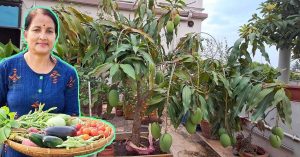IIT Bombay Graduates Turn Barren Land into Soil-Less Farming Haven; Save 80% Water
IIT Bombay graduates Amit Kumar and Abhay Singh innovated a medium-less farming technology to grow food sustainably at a 75% faster rate while saving 80% water compared to traditional methods. Learn more.
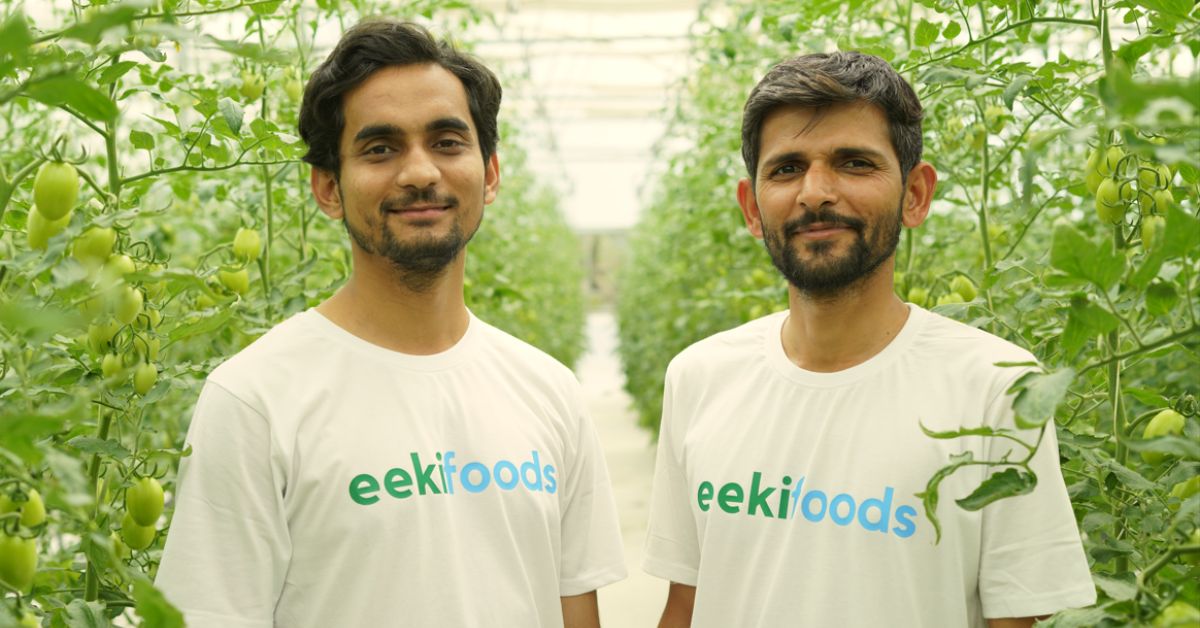
Can you imagine growing healthy, residue-free food without soil or coco peat? Rajasthan-based Amit Kumar and Abhay Singh — IIT Bombay graduates and good friends — made this happen in a big way. They co-founded Eeki Foods — a sustainable farming startup that uses hydroponics to grow food on a large scale.
The duo claim that their technique saves 80 per cent wastage of water with a growth rate that is 75 per cent faster than traditional methods. They grow food on barren lands using patented climate-proof chambers and are earning crores, annually.
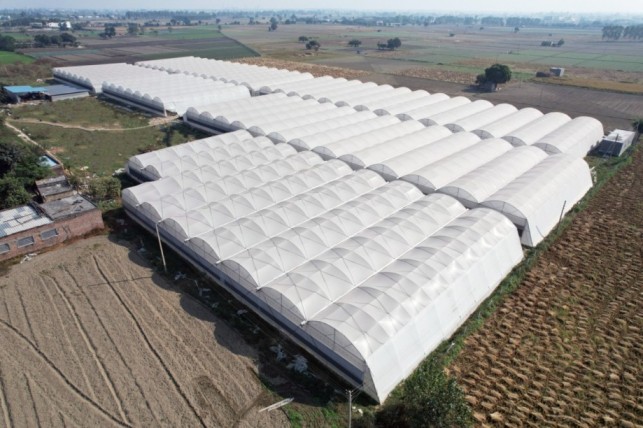
Eeki Foods has seven acres of farms in Panipat (Haryana), Kota district (Rajasthan), and Bundi district (Rajasthan), while another 33 acres of land is under construction.
“The name ‘Eeki’ comes from the Japanese belief ‘Ikigai’ which promotes living a healthy and purposeful life. We work on the same philosophy. We want to give the world a healthier and more sustainable way of growing food,” tells Abhay to The Better India.
A sustainable way of producing food
“We both had curious minds, and we worked together on different projects. We would stay back for hours after college to brainstorm ideas. We both had a keedha (drive) to do something for people. A major part of India’s population works in agriculture, so we thought of doing something in this field,” says Amit.
Coming from a farming background, the duo decided to innovate a farming technology that is sustainable, affordable and residue-free.
“On research, we realised that with the rising population in our country, we will face food scarcity in future. We also found that food has lost almost 45 per cent of its nutritional value. This information became our driving force — we wanted to use technology and make food items more accessible and readily produced,” he says.
The duo researched various variants of hydroponics to grow food and landed on one which they call medium-less farming. They got patent rights for their technology in 2022.
“We grow food in an empty chamber in a controlled environment. Roots hang in the air, irrigation happens, and we have our produce. We don’t use any soil or alternatives like coco peat to grow our vegetables and fruits,” shares Amit.
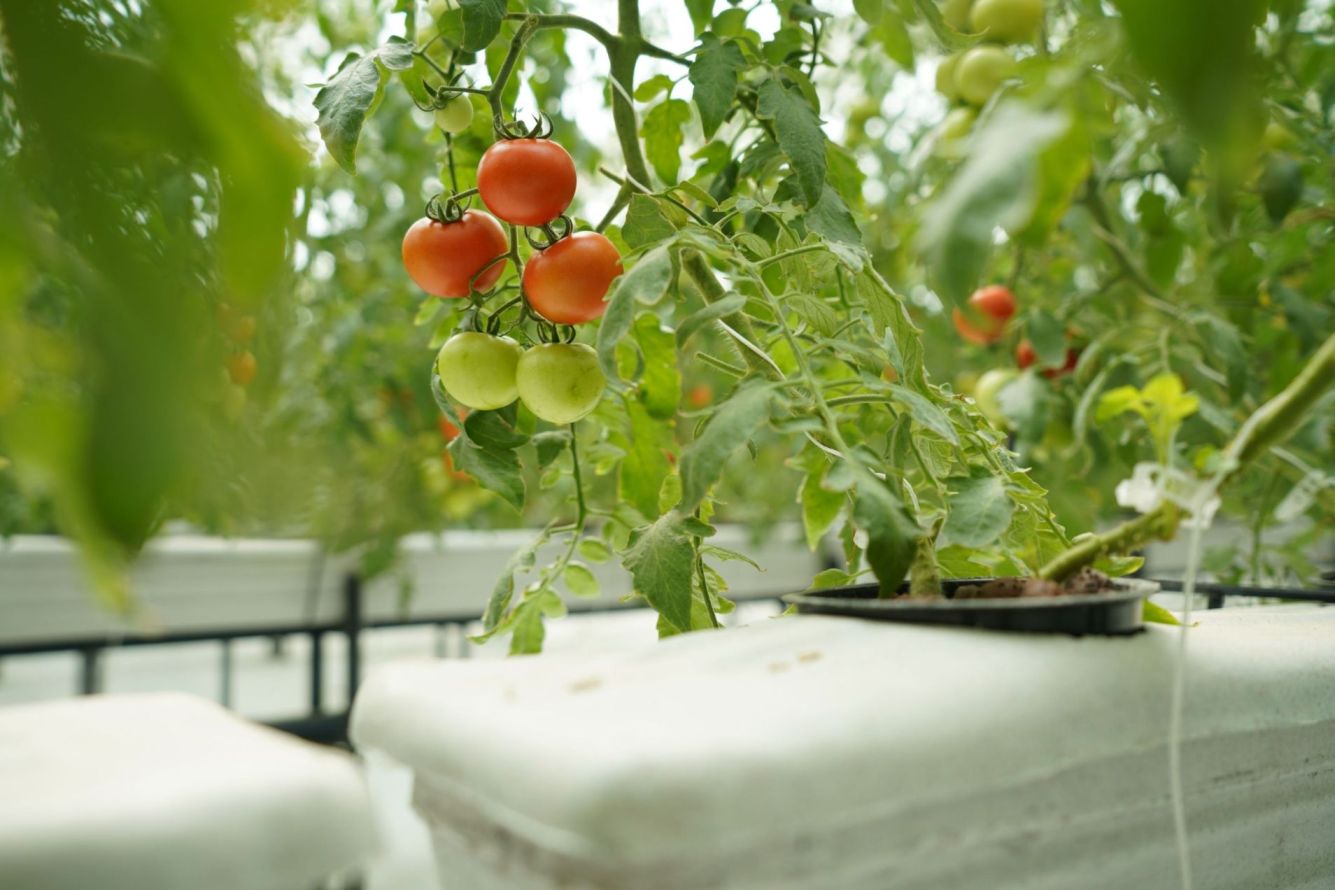
He further adds, “While there are many ways of farming, we realised that none of them was sustainable. For example, with organic farming — the yield is not very quick, and with the growing population, even if all of us shift to organic farming, the supply will run short. Similarly with coco peat-based farming — one has to replace coco peat after every yield which makes the process expensive and labour intensive.”
“But with our medium-less farming, we are removing all those constraints. To break the process into simple terms — what does a plant take from the soil? Water, oxygen, nutrients and support. As long as you provide these four things to the plant, it will grow and thrive. So, we take an empty room and fill it with 70 per cent humidity which is enough for plants to take water from. Then, we spray the roots with the required nutrients. The chambers where we grow our plants are built on the same principle. The roots hang in the air with support, but without any medium, and the plant grows,” he says.
“You see people growing money plants in bottles without soil, and we’ve seen lotuses that grow in water! Our technology works along the same lines,” explains Amit.
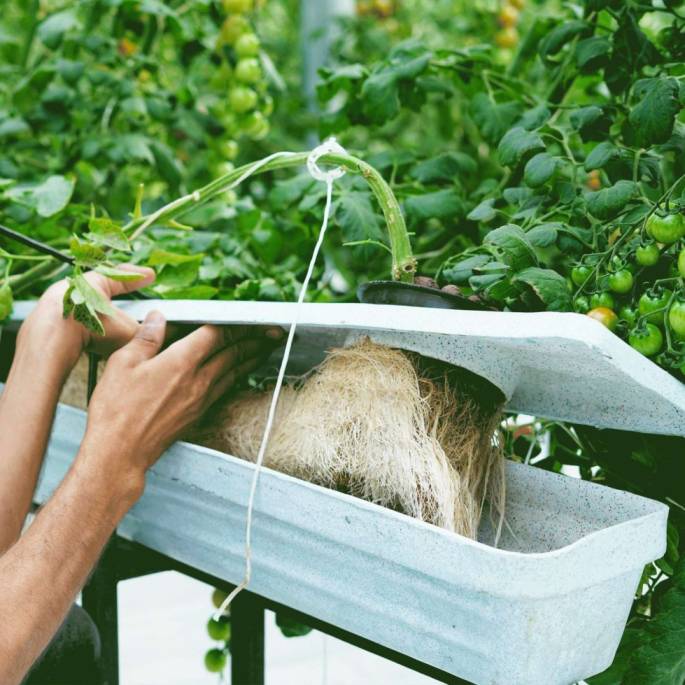
Eeki Foods has been growing vegetables like cucumber, tomato, eggplant, chilli, pepper, spinach, bottle gourd, bitter gourd, and coriander and fruits like musk melons and watermelons.
Talking about why farmers can benefit by switching to their method, Amit says, “Sikkim was the first state that adopted organic farming completely, but then they started to face issues in procuring natural manure. The method of organic farming might reduce the cost, but it also reduces the yield thereby reducing the farmer’s profits. Moreover, in a soil-based farming method, 60–80 per cent of the water goes to waste. But with our technique, the yield is faster and prevents any kind of water wastage as we save and reuse it.”
Manish Kumar, farm manager at Eeki Foods for more than three years says, “The technology is amazing. You are basically taking a barren piece of land with an almost negligible amount of water and growing food. I come from a farming background but this is completely different from what my grandfathers did, but it still works. The best thing is that it has the capability to provide produce any time of the year irrespective of the fruiting season.”
Since the food is grown in a controlled environment inside the chamber, Eeki Foods can provide vegetables and fruits irrespective of their fruiting season.
“In a place like Rajasthan, we are growing food where the temperature goes from 50 degrees Celsius in summers to -3 degrees Celsius in winters. We wanted to be able to grow food under any circumstances, and we are able to achieve that. Our method works on the toughest terrains,” adds Abhay.
What’s next?
“When we started, we were just looking to grow food without any medium while ensuring less wastage. Now that we have achieved that, we want to focus on the affordability of this method. Currently, our products are in the mandi (market) at the same rate as the produce from other farming methods. But, we want to make the technology such that everyone should be able to afford to grow food this way,” says Abhay.
“To grow one per cent of the required tomatoes as per our population we need 20,000 acres of fertile land. But with our technology, we can produce the same on 16,000 acres, and that too on barren land,” he says, adding that they produce 13,500 kg of tomatoes on one acre of land per month.
Talking about the produce, Amit says, “We have not yet experimented with root vegetables like carrots, potatoes and radishes. It is definitely possible to grow them also, and we are planning to work on that soon.”
“We started with the intention of innovating a sustainable farming method that will help people from all walks of life live healthier lives. So, we want to keep striking in that direction and research more into the field,” concludes Amit. If you found our stories insightful, informative, or even just enjoyable, we invite you to consider making a voluntary payment to support the work we do at The Better India. Your contribution helps us continue producing quality content that educates, inspires, and drives positive change. Choose one of the payment options below for your contribution- By paying for the stories you value, you directly contribute to sustaining our efforts focused on making a difference in the world. Together, let’s ensure that impactful stories continue to be told and shared, enriching lives and communities alike. Thank you for your support. Here are some frequently asked questions you might find helpful to know why you are contributing?

To know more, visit their official website.
(Edited by Pranita Bhat)
This story made me
-
97
-
121
-
89
-
167




